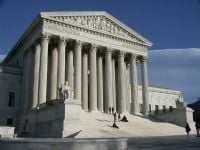LawFuel.com – Skadden Arps – On April 2, 2014, the U.S. Supreme Court issued its decision in McCutcheon v. FEC, striking down the aggregate limits imposed on individual contributions under federal law. The 5-4 opinion held that the individual aggregate limits under federal law are invalid under the First Amendment because they do not serve the only permissible government objective in restricting political speech: combatting quid pro quo corruption or the appearance of it. Prior to the decision, the Court largely had upheld contribution limits since Buckley v. Valeo.
In McCutcheon, the Court addressed the constitutionality of the $123,200 biennial aggregate limit on contributions from individuals under federal law. The Bipartisan Campaign Reform Act (BCRA) imposed two levels of contribution limits in federal elections: base limits and aggregate limits. Under the base limits for the 2013-2014 election cycle, which are still in effect, an individual may contribute up to $2,600 per election to a candidate ($5,200 total for the primary and general elections); $32,400 per year to a national party committee; $10,000 per year to the federal accounts of a state or local party committee; and $5,000 per year to a political action committee (PAC). In addition to these base limits, BCRA imposed an aggregate limit, which was $123,200 for the 2013-2014 election cycle. Of this $123,200 total, an individual could contribute no more than $48,600 to all federal candidates; and $74,600 to all federal PACs, national parties, and federal accounts of state parties, of which no more than $48,600 could go to federal PACs and federal accounts of state parties. In yesterday’s decision, the Court did not strike down the base limits, only the aggregate limits.
The Court previously had upheld aggregate limits in Buckley v. Valeo as constitutional, despite their restriction on speech, because they prevented circumvention of the base limit and thus, corruption. In McCutcheon, however, the Court found that aggregate limits in place under BCRA are not closely drawn to avoid unnecessary abridgment of associational freedoms. Specifically, the Court found that there are numerous federal restrictions now in place that prevent campaign contributions from giving rise to quid pro quo corruption including limits on contributions to PACs, regulations prohibiting earmarking, “more targeted” anti-circumvention measures and anti-proliferation rules.
This opinion has no impact on federal PAC contributions because federal PACs are not subject to an aggregate limit. Further, the opinion did not address the legality of corporate contributions and thus, the federal corporate contribution prohibition still applies.
The short-term effect of yesterday’s decision likely will not be dramatic, since very few individuals max out at the $123,200 level. We expect to see an increase in joint fundraisers encouraging large donors to give without the aggregate limitation. However, the long-term effect may be more significant; McCutcheon is the first notable Supreme Court case striking down contribution limits (as opposed to limits on independent expenditures). Further, state laws imposing aggregate limits could be in jeopardy. Additional challenges at the state level are likely. Currently, several jurisdictions impose aggregate limits on individual, PAC and/or corporate contributions.
You can read the opinion here: http://www.supremecourt.gov/opinions/13pdf/12-536_e1pf.pdf.




